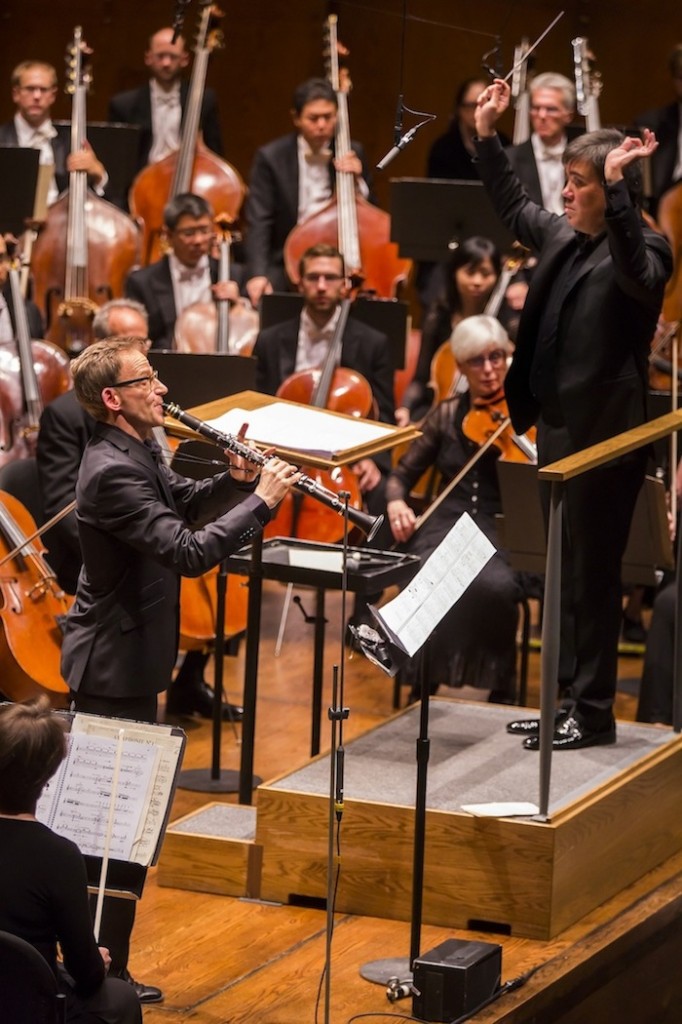New York Philharmonic gets down to business with Mahler, Chin premiere

Kari Kriikku performed the U.S. premiere of Unsuk Chin’s Clarinet Concerto Tuesday night with Alan Gilbert and the New York Philharmonic. Photo: Chris Lee
After last week’s peculiar gala concert, the New York Philharmonic was back to business as usual with its subscription opener on Tuesday night. The pairing of a U. S. premiere with a symphony by Mahler, ever a local favorite due to his own brief stewardship of the orchestra, made for a quintessential Gilbert-era Philharmonic program.
The premiere was Korean composer Unsuk Chin’s Clarinet Concerto, co-commissioned by the Philharmonic and four other international orchestras and premiered by the Gothenburg Symphony Orchestra in May. The clarinetist Kari Kriikku, who played the work with the Philharmonic and at its earlier premiere, will spend much of his 2014-15 season championing the concerto, with performances in Cologne, Barcelona, and London still to come.
Music director Alan Gilbert introduced the piece, as he often does with new works, by offering his thoughts from the stage. Whether this practice is helpful is up for debate—it seems to be an expansion of the role already fulfilled by program notes and the Phil’s nightly pre-concert lectures–but Tuesday’s podium speech was excessive. In addition to a verbal walk-through of the piece, Gilbert led the soloist and orchestra in five or six excerpts, which, aside from adding minutes to the clock (there was a great deal of seat-shifting and program-rustling by the time he had finished), actually dulled the impact of the boldfaced effects he was trying to illustrate when we finally heard them in the performance.
The concerto itself has intriguing moments and ideas, but too often felt directionless. Chin’s unique voice shines through here and there, but much of the concerto occupies familiar sonic space–a lurking eeriness facilitated by long, cold tones in the violins and winds, punctuated by metallic crashes of percussion.
Chin’s writing is at its most compelling and individual in the slow second movement, the aptly titled “Hymnos,” which opens with a haunting solo from the clarinet, voicing two pitches at once in harmony. The melancholy tonality here is paced out in soft, slow reverence, reminiscent of a church organ. Kriikku proved his virtuosic mettle in the finale, “Improvisations on a groove,” bringing to his frenetic part a sharp sound that cut right through the orchestra’s commotion.
For an orchestra that so touts its historical connection to Mahler, the Philharmonic did not immediately seem at home in his First Symphony on Tuesday. Ensemble was a problem throughout, but especially in the first two movements, likely due in part to Gilbert’s unusual freedom with his tempi. Tuning, too, was questionable, even among the strings.
The larger issue, at least in the first movement, was that the balance was simply off. The crashing fanfares came off well enough, but in the opening the unearthly chill of the sotto voce strings was disturbed by a woodwind entrance several notches above the prescribed pianissimo. The ethereal sections of this opening movement require an intense, almost myopic focus to achieve their gripping sense of foreboding, but one never got the sense that all sections of the orchestra were playing with the same goal in mind. Gilbert showed more control in the following movement, though more ease would have helped the slow waltz of the trio.
Gilbert took a very deliberate pace to begin the third movement, crafting the extended opening crescendo beautifully, and managing to capture the whimsical nature of the music’s back-and-forth character switches. But it was in the finale that the Philharmonic really hit its stride, opening with a tremendous burst of fire and moving through Mahler’s romantic peaks and valleys, transitioning sublimely through storm and serenity. As nowhere else in the symphony, Gilbert clearly traced the music’s arc, allowing it to have its epic scope but never losing sight of the destination.
This was some of the most powerful playing you’ll hear out of any orchestra, filling Avery Fisher Hall with massive, weighty sound. If those early-movement jitters get ironed out, audiences will be left with an impressive interpretation for the remaining three performances.
The program will be repeated 11 a.m. Friday, 8 p.m. Saturday and 7:30 p.m. Tuesday. nyphil.org